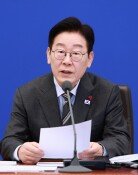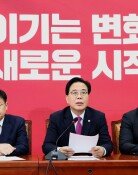Ruling Party Lawmaker Reveals Political Realignment Scenario
Ruling Party Lawmaker Reveals Political Realignment Scenario
Posted September. 22, 2005 07:44,
Rep. Yoo Ihn-tae, the head of the ruling Uri Partys political reform special committee, said in a press conference yesterday, If the current electoral system is changed, existing parties all will be split up. Since his remark is being interpreted as saying that reforming the electoral system will directly lead to political realignment, subtle aftereffects are being felt from the remarks.
Lawmaker Yoo said, If the current electoral system is reformed into either urban and rural mixed constituencies or a Germany-style proportional representation system, the ruling Uri Party will divide, with some members who are against the system leaving the party, adding, The same is the true of the Grand National Party.
He also said, Currently, a slew of lawmakers inevitably join specific parties in a bid to be elected as lawmakers, though their positions go against their parties platform due to deep-rooted regionalism, adding, When lawmakers who intend to break with their parties put their beliefs into practice, new politics will develop.
His remarks refer to the current state of Koreas politics where even if considerable number of lawmakers have not agreed to their parties policies, they have joined specific parties in a bid to become lawmakers by jumping on the bandwagon of a regionalism-based structure. Accordingly, if a new electoral system to break the regional structure system is introduced, lawmakers should select parties in accordance with their stance, thus naturally leading to a political realignment.
Regarding the direction in the political realignment through reforming the electoral system, lawmaker Yoo speculated, The number of parties will increase and reformist parties and conservative parties that seek to become parties based on support from across the country will be created.
The controversy surrounding President Roh Moo-hyuns idea of a coalition has been daunted, but Yoos remark clearly appears to be revealing the ruling Uri Partys ulterior motive that its ultimate goal will finally create a new political circle.
In other words, a big bang in the political circle is likely the goal the ruling Uri Party seeks to achieve. The order runs as follows: reforming the electoral system, building a multiparty structure and political alliances in accordance with ideologies and platforms.
The internal report related to a coalition that Cheong Wa Dae recently made public also stressed, A multiparty structure, proportional representation system and coalitions are harmonious with one another.
Meanwhile, during a meeting on the same day, the ruling Uri Partys political reform special committee decided to review measures in which it will introduce a multi-member, one-district system in Seoul, six metropolitan cities and city areas whose population is more than 600,000, and urban and rural-mixed constituencies that maintain the current single-member districts in other areas.
Cities with more than 600,000 people, excluding Seoul and six metropolitan cities, are Seongnam, Bucheon, Suwon, Goyang and Ansan, Gyeonggi Province, and Jeonju, North Jeolla Province and Cheongju, North Chungcheong Province.
Jung-Hun Kim jnghn@donga.com







